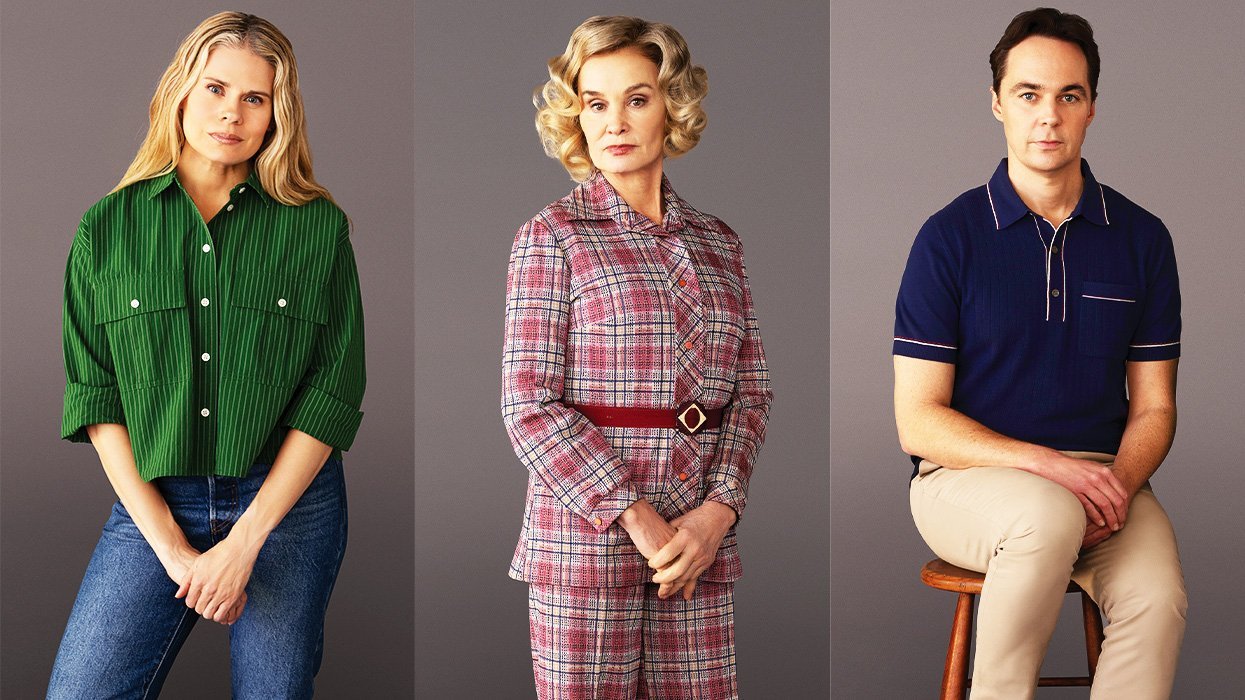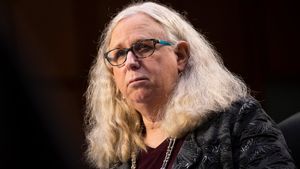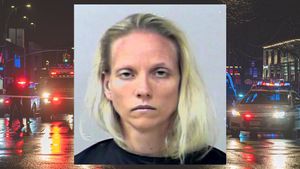Emmy winner Jim Parsons was a freshman in college when he was introduced to playwright Paula Vogel’s The Baltimore Waltz. In that play, a sister imagines the European odyssey she’d have made with her terminally ill brother, Carl, as she keeps vigil at his hospital bedside. The piece was, in part, the playwright’s love letter to her brother, Carl Vogel, who died of complications from AIDS in 1988. In the dedication she wrote, “To the memory of Carl — because I cannot sew,” a nod to the panels of fabric people created for the AIDS Memorial Quilt in honor of loved ones they lost.
“There’s a magic about [The Baltimore Waltz]. It’s kind of a fairy tale in the way it lays out,” says Parsons. “[I] was so taken with the way the whole thing was [Vogel’s] attempt to take [us] through her imagination of this vacation with her dying brother that she never got to take.”
Now, more than 30 years after The Baltimore Waltz, Vogel revisits family and sibling dynamics in her semiautobiographical Mother Play, premiering on Broadway with Parsons portraying another imagining of Carl. There’s a sister in this one too, Martha, loosely based on Vogel, who is a lesbian. The Gilded Age star and Broadway veteran Celia Keenan-Bolger steps into Martha’s sensible shoes. As in The Baltimore Waltz, there’s a journey and there’s a story of HIV and AIDS. This time the voyage is through various apartments around Maryland, Vogel’s home state. At the apex of the play’s triad is Carl and Martha’s mother, Phyllis — with the Oscar-winning Jessica Lange in the role. Newly divorced and penniless in the early ’60s and sporting used Chanel, a cigarette in one hand and a gin martini in the other, Phyllis does her level best to raise two burgeoning queer teens in “sub-basement” apartments where the roaches and rats practically choreograph themselves.
Mother Play is the latest in a long canon of great American plays that tickle the underbelly of the nuclear family. It stands among Eugene O’Neill’s Long Day’s Journey Into Night, Lorraine Hansberry’s A Raisin in the Sun, and Tracy Letts’s August: Osage County, but audiences may draw a through line to Mother Play from Tennessee Williams’s The Glass Menagerie, another (mostly) three-hander that centers a mother, son, and daughter.
“Anytime you have this kind of familial trauma, whether it’s addiction or alcoholism or abuse or whatever, dynamics between the family [are] constantly shifting,” Lange says. “I’ve always found that in cases like this, these great family plays, the alliances keep changing.”
Like Parsons, Keenan-Bolger was a freshman in college when she first became aware of Vogel, in this case with her Pulitzer Prize-winning How I Learned to Drive (1997), a memory play with autobiographical elements in which a woman recounts grooming and sexual abuse as a teen at the hands of her uncle and driving instructor. That play was also Lange’s first foray into Vogel, and it inspired her to dive into the playwright’s oeuvre. When Mother Play came to her, Lange was primed.
“It had everything in place that I had been looking for: a new play, Paula Vogel, this cast, and a great part!” Lange says.“What I love about the way we’ve worked so far in the workshop, and also working with Paula right there in the room, is that we’ve been given free license and time to really discover and investigate all of these [shifting family dynamic] moments,” she adds. “I’ve never worked with a living playwright…. It’s been such a gift.”
Families and queerness are central to Vogel’s work, including in The Baltimore Waltz and And Baby Makes Seven, about a queer modern family. Vogel’s recent work Indecent (2015) told the tale of a 1923 Yiddish play banned in New York City for its lesbian love story.
The cast of Mother Play extols the fortune of working with Vogel throughout the rehearsal process. And they’re also grateful for out director Tina Landau (Superior Donuts, SpongeBob SquarePants) at the helm of a play rife with nuance for queer audiences. There’s even a scene where Carl catches Martha reading Radclyffe Hall’s The Well of Loneliness, given to her by her mother as a cautionary tale about the sad spinsterhood of lesbianism.
“It feels historic to me to have a play written by a queer woman, directed by a queer woman, premiering on Broadway,” Keenan-Bolger says.
Throughout the play, there is a nimble triangulation of the familial characters. “As the mother I use Jim [Carl] against Celia [Martha] or vice versa, so nothing is ever absolutely natural or comfortable within the family,” Lange says. “There’s always some dynamic that is undermining what should be a loving, warm, accepting kind of familial group.”
But the shared and divergent experiences of the queer siblings cement their allegiance to one another. Carl is the “genius” and his mother’s favorite until he comes out as a proud gay radical. And Martha is continually in the shadow of the big brother she worships and who protects her. There’s a scene early in Mother Play where Martha, barely in her teens, arrives home enraged and terrified from being bullied and assaulted by boys on the bus. Having been bullied himself, Carl teaches Martha to walk and dress “butch” at the same time she implores him to keep the incident a secret from their mother. The shorthand of their interaction sets up an unspoken pact for the remainder of the play — they will protect one another.
“The dynamic between Carl and Martha is that he basically opens this portal to say, ‘Whoever you are, whatever you are, is OK,’” Parsons says. “The idea that [kind of understanding of queerness] could exist inside of a family in that time period is revelatory.”
Mother Play begins in the early ’60s and unfolds over decades. The characters age and evolve with Carl and Martha earning degrees at excellent schools, accomplishments that feed Phyllis’s insecurity for not attending college — she was a young single mother, after all. As with Vogel’s experience with her brother, the Carl of the play contracts HIV in the late ’80s. During what Parsons says was a time of “sexual discovery” as a young gay man, stories of HIV and AIDS were ubiquitous. He says the experience was “terrifying” and “affected me deeply.” Yet he values storytelling that preserves the memory of so many queer lives.
“Having been fortunate to be a part of things like The Normal Heart and just other things dealing with homosexuals through the years [The Boys in the Band] and especially specifically with HIV and AIDS, it never becomes old news. It never becomes un-shocking — the amount of lives that were wiped away,” Parsons says.
The play begins in an era when divorced women and single mothers were ostracized, before Stonewall, the AIDS epidemic, and marriage equality. But it arrives on Broadway during a national backlash against queer people. Recent years have seen the introduction of hundreds of anti-LGBTQ+ bills in the United States and the banning of queer books, drag shows, and LGBTQ+ history. Vogel’s universal and revolutionary storytelling is right on time.
“If we think about timely, and we think about art reflecting culture, this play is positioned not just in what it contains in the writing, which is truly spectacular, but that these two women [Vogel and Landau], in this moment, are bringing a play to Broadway,” Keenan-Bolger says. “It’s very moving to me to get to be a part of it. And it’s very moving to me that the theater is a place that can both represent and hold a mirror up to the culture.”
Mother Play begins April 3 at the Hayes Theater in New York City. Find tickets at 2st.com.
This story is part of Out's March/April issue, which hits newsstands on April 2. Support queer media and subscribe — or download the issue through Apple News, Zinio, Nook, or PressReader starting March 18.








































































